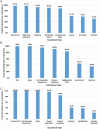Educating Families of Children Newly Diagnosed With Cancer
- PMID: 27268501
- PMCID: PMC5138147
- DOI: 10.1177/1043454216652856
Educating Families of Children Newly Diagnosed With Cancer
Abstract
Parents/caregivers require specialized education in order to care for their child with a newly diagnosed cancer. Currently, no evidence-based guidelines exist to identify content essential for inclusion in patient/family education prior to a child's initial discharge home; this study used Delphi methodology to obtain multidisciplinary consensus regarding essential content amongst pediatric oncology experts from the Children's Oncology Group. Three questionnaire rounds were employed to identify essential content, evaluate the importance of the educational topics identified, and gain expert consensus regarding the final ranking of topics identified and whether or not each topic was considered mandatory for inclusion in education for newly diagnosed patients. Disease-specific topics were also identified for patients with leukemia, solid tumors, and central nervous system tumors. The results of this study provide, for the first time, multidisciplinary expert consensus regarding key content essential for inclusion in discharge education for newly diagnosed pediatric oncology patients.
Keywords: Children’s Oncology Group; Delphi study; childhood cancer; educating families.
Conflict of interest statement
Figures


References
-
- Cavusoglu H. (2000). Problems related to the diagnosis and treatment of adolescents with leukemia. Issues in Comprehensive Pediatric Nursing. 2000;23:15-26. - PubMed
-
- Dalkey N. C., Helmer O. (1963). An experimental application of the Delphi method to the use of experts. Management Science, 9, 458-467.
-
- Freeman K., O’Dell C., Meola C. (2003). Childhood brain tumors: Children’s and siblings’ concerns regarding the diagnosis and phase of illness. Journal of Pediatric Oncology Nursing, 20, 133-140. - PubMed
MeSH terms
Grants and funding
LinkOut - more resources
Full Text Sources
Other Literature Sources
Medical

